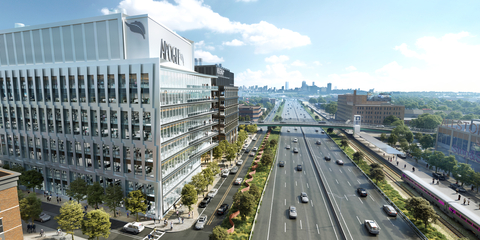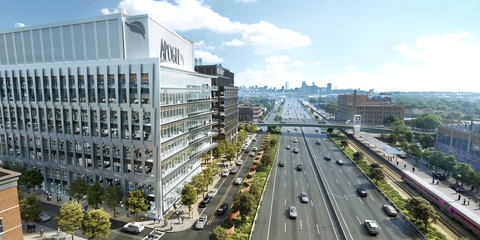BOSTON--(BUSINESS WIRE)--Berkeley Investments announced that its latest life science project, 176 Lincoln in Boston, Massachusetts, has been fully approved and is poised to become a dynamic, transit-oriented, mixed-use development featuring Class A lab and R&D space, offices, and residential units providing high visibility along Interstate 90 (the Mass Pike) and immediate access to downtown Boston and Harvard Square in Cambridge.
The project’s location in the Allston section of Boston serves as a gateway to the city from the highly desirable western suburbs and is in immediate proximity to Harvard’s recently completed Paulson School of Engineering and Applied Sciences (SEAS); the Harvard Business School; and the recent expansion of Harvard academic and cultural facilities such as the Harvard Innovation Labs, ART, and Art Lab. The expanding Harvard presence in Allston is establishing a new cluster for innovation and research in Greater Boston and reinforcing the strong development link between two existing world-renowned medical research and life science clusters: the Longwood Medical Area (LMA) in Boston and the MIT/Kendall Square powerhouse in Cambridge.
“With its location adjacent to Harvard’s growing Allston campus and its introduction of state-of-the-art Class A lab space, 176 Lincoln will be an important addition to the rapidly growing life science, medical, academic research, and corporate corridor stretching through Boston and into Cambridge,” said Young Park, president of Berkeley Investments. “176 Lincoln will create a brand-new innovation cluster in Boston that will draw together scientists, researchers, innovators, artists, and residents in a beautifully landscaped setting, steps away from public transit, ten minutes from Logan International Airport, and with easy access to and high visibility from I-90.”
The 176 Lincoln project, designed by award-winning international architect CBT, will rise on a five-acre site that will incorporate two acres of landscaped open space. The project will create an ‘innovation village’ combining workplaces for cutting-edge research with housing for the region’s growing population, along with incorporating creative spaces for artists and public gathering places to promote collaboration as well as chance encounters. The two main commercial buildings will include 720,000 square feet of lab, R&D, and office space with exceptional branding opportunities along I-90 in one of the fastest-growing innovation districts in the Northeast. In addition, the project will include on-site housing, including 252 apartments with ten live / work units for artists and walkable access to the Charles River public parks, trails, and outdoor amenities. The project is aiming to achieve passive house certification.
As a transit-oriented development, 176 Lincoln is located optimally to attract a highly educated regional workforce with walkable proximity to the MBTA Boston Landing train stop and easy access to the Mass Pike (I-90) Allston interchange. In addition, the City of Boston and the Commonwealth of Massachusetts are actively planning a major highway / multi-modal transportation project along the Mass Pike that will dramatically transform the entire area formerly used as a rail yard and increase public transit options for future residents and commercial tenants while opening over 100 acres of land for future mixed-use innovation, research, and community-oriented residential development.
“176 Lincoln is on track to become a crucial driver in the accelerating growth of life science and R&D industries in the Western quadrant of Boston along the Charles River, an area that already features Boston Landing, the world headquarters of New Balance and the first SmartLabs in Boston, along with the rapid growth of the life science cluster in Watertown,” said Morgan Pierson, senior vice president for development at Berkeley. “The long-term economic and development potential of this area, starting with 176 Lincoln as its gateway, could well equal the transformative emergence of the Seaport District in Boston over the last ten years, or in some aspects, the Hudson Yards development on the West Side of Manhattan.”
The 176 Lincoln Project is also designed to respond to a future that demands a far more sustainable and inclusionary approach to development and construction. Among the many sustainability features, the Project includes LEED Gold-certified buildings and a 100 percent electrical residential building, resulting in a 90 percent reduction in fossil fuel use.
Berkeley intends to break ground on 176 Lincoln in 2024 with a completion date in 2028.
Berkeley continues to manage a development and investment pipeline in the life science space with roughly 750,000 square feet of lab, biomanufacturing, and commercial space being actively constructed or leased up in Greater Boston, including a fully entitled, shovel-ready 203,000 sf cGMP/biomanufacturing development located in Billerica; a Class-A life science redevelopment in Watertown and a 350,000 sf, transit-oriented development project in Malden, minutes outside of Boston.




